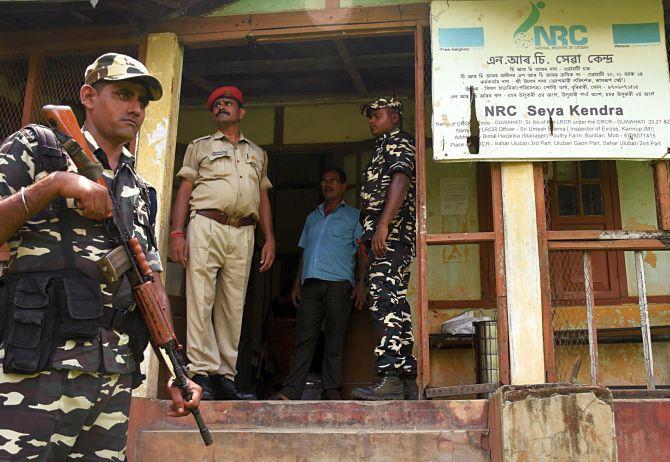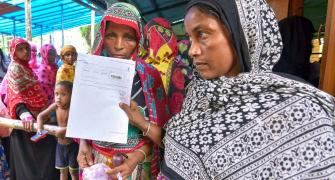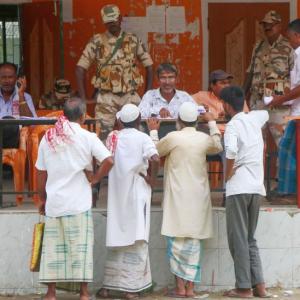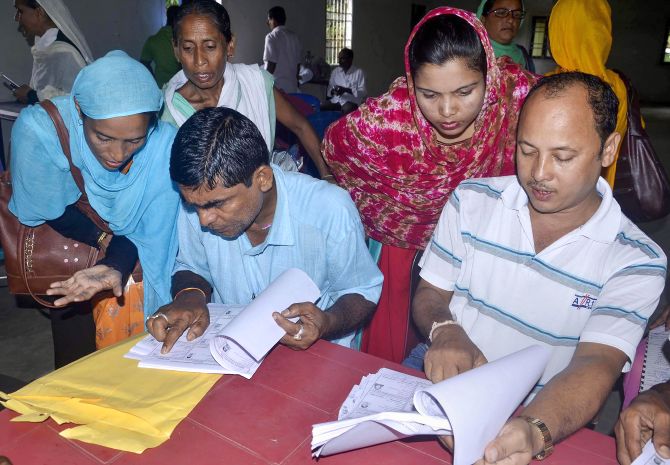'An expanded and improved NRC implemented in stages is key to effectively monitor and control illegal immigration; its most important effect being its deterrent value, staving off future illegal immigration and acting as a restraint to the votaries of vote bank politics,' says Vivek Gumaste.

The release of the much-awaited final list of the National Register of Citizens in Assam has provoked a rash of knee-jerk conclusions and responses, with critics dubbing the NRC as an experiment gone awry sans any tangible benefits, the usual nay-sayers castigating it as an anti-Muslim witch-hunt, and alarmists stoking fears of human rights violation; it has even stirred deep consternation in the ranks of its ardent proponents.
But are these emotive outbursts corroborated by facts, figure or logic?
Does this mean that the NRC is a failed enterprise as an antidote to illegal immigration; a futile project that should never have been undertaken and one that should now be discarded?
And are we chasing a chimera, a demon that never existed, as some have claimed quoting the recent data garnered by the NRC update?
The answer to all these questions is a categorical 'No'.
To make a valid and rational evaluation of the NRC and counter its critics, we need to recollect the historical antecedents of illegal immigration in the north-east, mull over the construct of this decree, and analyse the figures generated by the current update.
The migration of indigent Muslim peasants from undivided Bengal to the fertile areas of Assam can be traced back to the 1800s and was instigated by the British. This flow of immigrants has continued unchecked since then to the present times despite the altered geo-political conditions that saw Assam and Bengal fall on different sides of an international border, effectively making this relocation an illegal process.
In 1998 Lt-Gen SK Sinha, the then governor of Assam, in a landmark report submitted to the President of India titled 'Report on Illegal Migration into Assam', outlined the dangers posed by illegal immigration into this sensitive border state.
In his cover letter he wrote: 'Large scale illegal migration from East Pakistan/Bangladesh over several decades has been altering the demographic complexion of this state. It poses a grave threat both to the identity of the Assamese people and to our national security.'
While the exact number of illegal immigrants remains unclear, a reasonable estimate suggests that there are anywhere between 10 and 20 million illegal immigrants with Assam and West Bengal being the states most affected.
Successive governments (both UPA and NDA) have confirmed this; Sriprakash Jaiswal, Union minister of state for home affairs in the UPA government, indicated in 2004 that there were 12 million illegal Bangladeshis with 5.7 million in West Bengal alone; more recently, Kiren Rijiju, minister of state for home affairs in the NDA government, put the figure at around 24 million.
Illegal immigration is not an illusion or a fantasy of right-wing fanatics but an undeniable reality with serious ramifications for our internal stability and national security and cannot be wished away. Therefore, to claim that fears of illegal immigration smacks of xenophobia, is both myopic and naive.
Further, to damn the NRC as a whim of the BJP and an anti-Muslim witch-hunt is both fallacious and misleading.
The NRC for Assam has been in existence on paper since 1951 but was never seriously implemented. Following the 1985 Assam accord (crafted by Rajiv Gandhi, the then Congress prime minister) that came at the end of a six-year violent agitation by Assamese Students against illegal immigration, the NRC was resurrected and underwent modification to include changing the cut-off date to midnight of March 24, 1971.
Despite the renewed focus, the NRC continued to remain in limbo, defunctionalised by the blatant vote bank politics of local Congress governments.
Eventually, in 2013, the Supreme Court intervened responding to a writ petition and issued a directive to the Union and state governments to update the NRC in accordance with the Citizenship Act, 1955 and the Citizenship Rules, 2003: hence the current update.
So, let us be clear about one thing: the current NRC update is a Supreme Court sanctioned exercise in accordance with the Constitution of India and not a communally motivated agenda of the BJP as some in the India media have conjectured and which has been religiously parroted by the international media.
Next, coming to the recently released data. Out of 3,30,27,661 applicants, a total of 3,11,21,004 persons were found eligible for inclusion in the final NRC. About 19 lakhs or roughly 6% per cent were excluded.
Critics have gone to town quoting this figure of 6% to claim that illegal immigration is not as significant as has been made out to be. This is a false inference: even a figure of 6% has humongous implications in demographic terms and can be the tipping factor, especially in areas where communities are evenly balanced.
Moreover, the relatively low figure of 19 lakhs is an underestimate; for every illegal immigrant picked up by the system four get through (Jamwal, N S. 'Border Management: Dilemma of Guarding the India-Bangladesh border' (PDF). Strategic Analysis, January-March 2004.). As per this assumption, there could easily another 76 lakhs out there, giving a combined total of 95 lakhs or close to 1 crore for Assam alone.
Therefore, when analysed carefully, the NRC update proves to be an effective instrument in outlining the magnitude of the problem in Assam.
Should the NRC be expanded to include other states and the nation as a whole?
Estimates indicate that the number of illegal immigrants in West Bengal surpasses that of Assam; several other states also house large numbers of illegal immigrants. Free mobility across states adds another dimension to this challenging problem and in theory can only be captured by a pan-Indian exercise.
The logistic and economic cost of such a venture is likely to be prohibitive and hence a graded implementation maybe the answer.
Deportation of those identified as illegals may not be practical at this juncture and a humanitarian approach is vital. The external affairs ministry has rightly assured: 'Any decision that is taken during the process of implementation of the NRC, will be within the four corners of the Indian law and consistent with India’s democratic traditions... Exclusion from the NRC has no implication on the rights of an individual resident in Assam.'
As a subtext to the humanitarian element, the plight of refugees (Hindus, Sikhs, Christians) fleeing religious persecution excluded by the NRC must be addressed. They cannot be labelled as illegal immigrants. Their plight, which has been expediently neglected by traditional human rights activists, must be resolved as a separate issue via the reintroduction of the Citizenship Amendment Bill.
However, humanitarian concerns cannot completely overshadow the long-term serious impact of illegal immigration on internal stability (the simmering discontent in Assam and north-east may boil over at any time) and national security (demographic alterations along the Indo-Bangladesh is a recipe for another Kashmir in the making) which can corrode the very foundations of our nation and destroy its social fabric. No cost, economic or otherwise, is too prohibitive to protect the sovereignty of our nation and ensure the safety of our citizens
An expanded and improved NRC implemented in stages is key to effectively monitor and control illegal immigration; its most important effect being its deterrent value, staving off future illegal immigration and acting as a restraint to the votaries of vote bank politics.
The NRC must remain, despite no immediate tangible gains. Its long-term gains are definitely tangible.
US-based academic and political commentator Vivek Gumaste is the author of My India: Musings of a Patriot.










